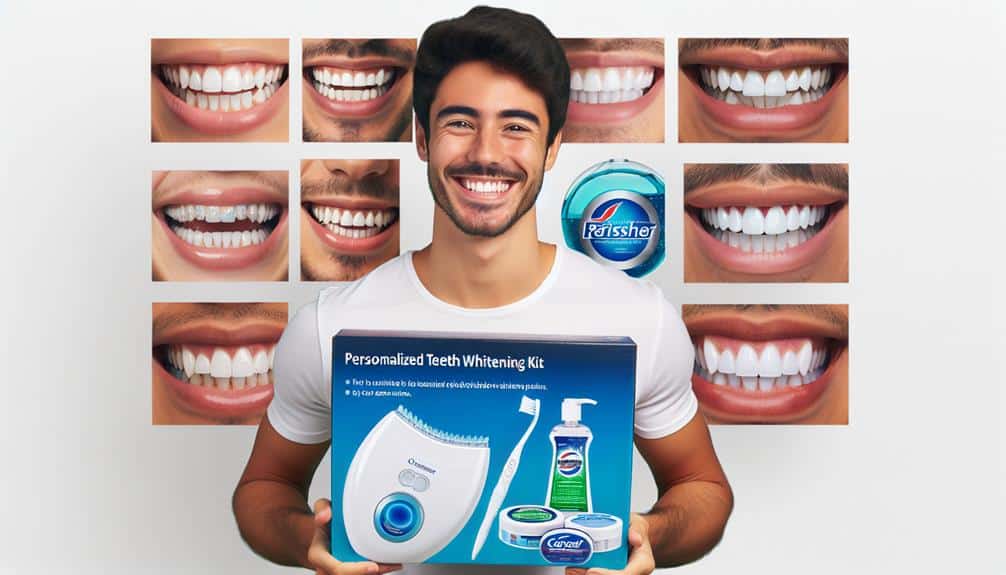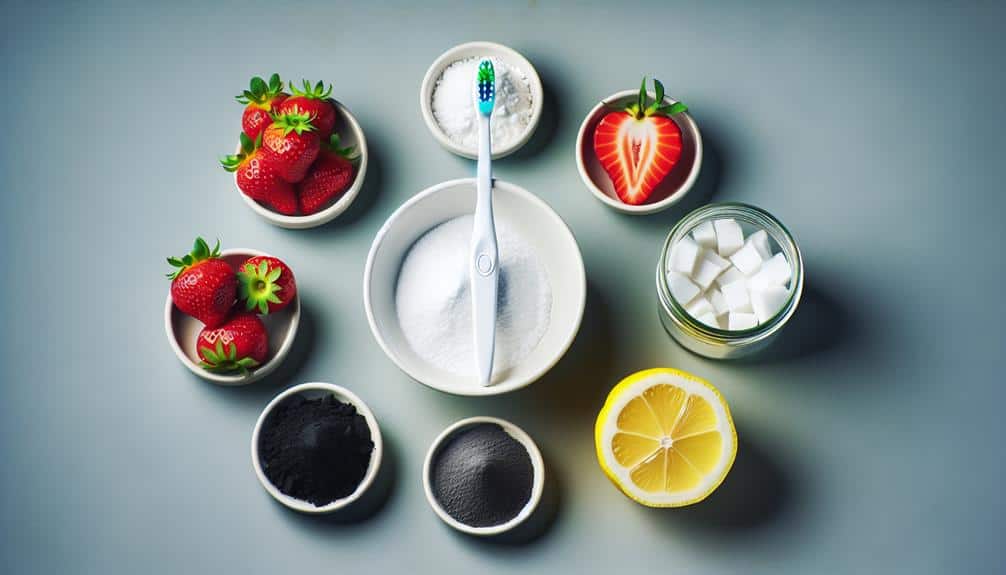To enhance your teeth whitening success, start by understanding the procedures available, including professional treatments at the dentist or DIY methods with over-the-counter kits. Consider factors such as dietary habits and lifestyle choices that affect whitening outcomes. Choose the right treatment by researching effective products and considering your budget. Maintain whiteness long-term with good oral hygiene practices, avoiding teeth-staining items, and regular dental cleanings. Combining whitening with proper dental care guarantees lasting results. Achieving a bright smile hinges on tailored strategies that cater to your specific needs.
Key Points
- Consider your budget and choose a whitening option that fits your financial constraints.
- Evaluate the effectiveness of DIY kits versus professional treatments for your specific needs.
- Tailor your whitening approach based on your dietary habits and lifestyle choices.
- Maintain good oral hygiene practices to prolong and enhance whitening results.
- Seek professional advice to customize a whitening plan that suits your individual requirements.
Understanding Teeth Whitening Procedures
To effectively brighten your smile, understanding teeth whitening procedures is essential. With recent whitening technology advancements, there are now more options available than ever before.
Professional treatments performed by dentists offer quick and efficient results. These procedures often involve the use of potent whitening agents and specialized tools that can deliver noticeable improvements in just one session.
On the other hand, if you prefer a more cost-effective approach, there are various DIY whitening methods you can explore. These may include over-the-counter whitening kits, whitening toothpaste, or natural remedies like baking soda and hydrogen peroxide. While these methods may take longer to show results compared to professional treatments, they can still help enhance the whiteness of your teeth over time.
Understanding the differences between professional procedures and DIY methods can help you choose the best teeth whitening option that aligns with your goals and preferences.
Factors Affecting Teeth Whitening Results
Understanding the factors that influence teeth whitening results is key to achieving the desired level of whitening for your smile. When it comes to teeth whitening, your dietary habits play an essential role. Foods and beverages such as coffee, tea, red wine, and certain fruits can stain your teeth, affecting the whitening process. Making conscious choices to limit consumption of these staining items can help maintain the results of your whitening treatment.
Additionally, lifestyle choices like smoking can greatly impact the effectiveness of teeth whitening. Nicotine and tar from smoking can cause deep stains that are challenging to remove with standard whitening treatments. Hence, quitting smoking or reducing tobacco use can't only improve your overall health but also enhance the longevity of your whitening results.
Choosing the Right Whitening Treatment
Choosing the right whitening treatment for your teeth is vital in achieving the best results. When considering your options, it's important to weigh various factors to make an informed decision that suits your needs. Here are some key points to keep in mind:
- Product recommendations: Research and consider reputable teeth whitening products that have proven effectiveness and positive reviews from users.
- Cost considerations: Evaluate the cost of different whitening treatments, including DIY kits and professional treatments, to determine what fits within your budget.
- DIY options: If you prefer a more budget-friendly approach, DIY whitening kits can be a good choice, but make sure they're safe and approved by dental professionals.
- Professional treatments: Professional whitening treatments performed by dentists offer quick and effective results, especially for stubborn stains that may not respond well to over-the-counter products.
Maintaining Whitened Teeth Long-Term
Maintain the brightness of your whitened teeth by incorporating good oral hygiene habits and avoiding habits that can cause staining. To prevent stains and preserve your pearly whites, it's crucial to maintain healthy habits. Brush your teeth at least twice a day using a whitening toothpaste to remove surface stains. Floss daily to clean between teeth and prevent plaque buildup, which can lead to discoloration. Additionally, consider using a whitening mouthwash to help maintain your results.
Avoid foods and drinks that are known to stain teeth, such as coffee, tea, red wine, and berries. If you do consume these items, brush your teeth or rinse your mouth with water afterward. Smoking is another significant culprit in teeth discoloration, so quitting smoking can't only benefit your overall health but also help in maintaining your bright smile.
Combining Whitening With Dental Care
To ensure the longevity of your teeth whitening results, it's important to incorporate proper dental care practices alongside your whitening routine. Maintaining good dental hygiene habits is essential for not only the health of your teeth but also for the effectiveness of whitening products.
Here are some tips to help you combine whitening with dental care successfully:
- Regular Brushing and Flossing: Brush your teeth at least twice a day and floss once daily to remove plaque and prevent staining.
- Use Whitening Toothpaste: Opt for a toothpaste specifically designed to help maintain whiter teeth and remove surface stains.
- Schedule Dental Cleanings: Visit your dentist regularly for professional cleanings to keep your teeth healthy and your whitening results bright.
- Avoid Staining Foods and Drinks: Limit your consumption of coffee, tea, red wine, and other known teeth-staining substances to preserve your whitened smile.
Frequently Asked Questions
Can Teeth Whitening Treatments Cause Sensitivity or Damage to the Enamel?
To safeguard your enamel during teeth whitening, use enamel protection products like fluoride toothpaste and avoid acidic foods. Prevent sensitivity by using desensitizing toothpaste and opting for professional treatments. Consult your dentist for personalized advice.
What Are Some Natural Methods to Maintain White Teeth After a Whitening Treatment?
To maintain white teeth naturally after whitening, focus on prevention through lifestyle habits. Incorporate natural remedies like oil pulling and baking soda. Avoid staining foods and drinks, practice good oral hygiene, and visit your dentist regularly for maintenance.
Is It Possible to Over-Whiten Teeth and Cause Harm to Them?
You can over-whiten teeth, leading to long term effects like enamel damage and increased sensitivity risks. To prevent harm, follow safety precautions, seek professional advice, and avoid excessive whitening treatments to maintain a healthy smile.
How Often Should Touch-Up Treatments Be Done to Maintain Whitened Teeth?
To maintain whitened teeth, touch-up treatments should be done every 6-12 months. Consistent touch-ups guarantee long-term results. They're like periodic maintenance for your sparkling smile, keeping it bright and vibrant for years to come.
Are There Any Foods or Drinks That Should Be Avoided to Prevent Staining After a Whitening Treatment?
To prevent staining after whitening, avoid foods and drinks like coffee, tea, red wine, and dark berries. Opt for water, milk, and clear beverages instead. Post-treatment, stick to white or light-colored foods to maintain your bright smile.




